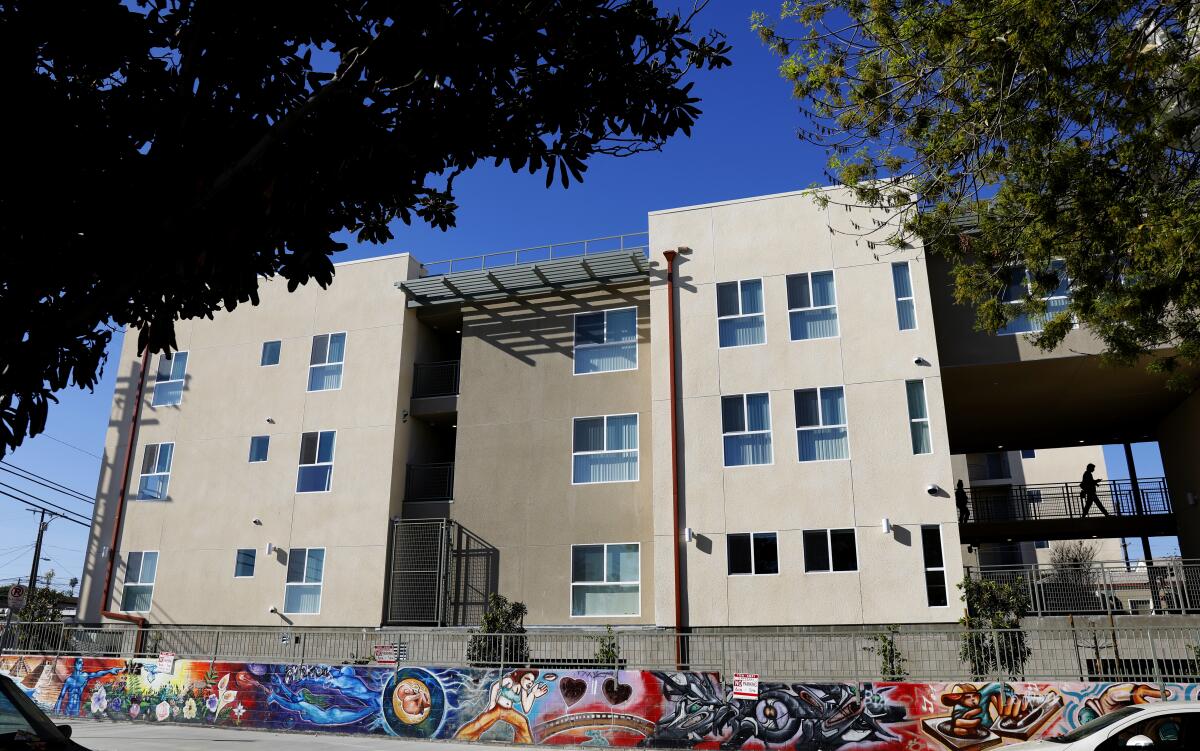This is not the time to claw back L.A. homeless housing money to build shelters

- Share via
With homelessness a continuing crisis despite the heavy investments by Los Angeles city and county governments, the need for more housing is dire. In an effort to find more funds, some officials and advocates have turned their attention to Proposition HHH, the measure that authorized the sale of $1.2 billion in bonds to help finance thousands of units of housing for homeless and low-income people in Los Angeles. The bond measure was overwhelmingly approved by city voters in November 2016, and the first bonds were issued in 2017.
Although all but $30 million of the money has been committed, the process of getting things built has been excruciatingly slow. In the four years since the first bonds were issued, only seven projects with a total of 489 units have been completed and occupied.
Critics of the HHH program are exploring the possibility of clawing back millions of HHH dollars allotted to developers who have yet to start construction. So is U.S. District Judge David O. Carter, the jurist overseeing a city-county agreement to shelter thousands of homeless people. The goal would be to spend the reclaimed money on shelters and less expensive, more innovative forms of housing.
Taking back HHH dollars from numerous projects not yet built is a colossally bad idea. Even if the city can legally do this, it shouldn’t.
Although shelter beds are in short supply, permanent housing is more important in the long run. It is the key to making a dent in homelessness. It is what all homeless people ultimately need to transition out of homelessness. And HHH is a dedicated source of funding for that.
The HHH program certainly deserves some of the criticism it has gotten. The rollout has been slow, scheduled openings have been pushed back, and some of the projects have grown more expensive than developers expected. One factor is rising labor and material expenses. Another is the costs associated with having to cobble together funding from several different sources — contrary to public perception, none of the projects is wholly financed by HHH funds (for most, HHH covered a third or less).
HHH developers were given two years from the time they got the city’s letter of commitment to line up funding and secure the necessary permits and approvals. Developers use that city commitment to raise money from other sources. This is not the time to snatch that away from them.
This program offers an opportunity to build the kind of housing that homeless people will want to move into and that neighborhoods will welcome. That was another time-consuming step — developers consulted with communities to seek their buy-in.
It’s true that the text of HHH allows money to be spent on shelters and temporary structures, but city officials rightly pitched the measure as one that would build desperately needed permanent housing. That need has only grown since voters approved the project. This money should not be diverted to shelters, which offer temporary respite from a street corner but do not resolve homelessness. Meanwhile, there is still $30 million in HHH funding available. That could be allocated to developers who are building permanent housing faster and cheaper with innovative materials.
Currently, there are 44 projects with 2,779 units in construction. Within several months, city officials say, 16 more projects with 858 units are expected to close their construction financing. By the end of this year, 28 more projects with 1,929 units are expected to do the same, with the remaining 29 projects with 1,906 units expected to secure their financing by the end of 2022.
There are ways to speed up the construction of HHH-funded projects. The permitting and entitlement process in the city is simply too sluggish despite whatever reforms the city government has made. More needs to be done to fix that.
It’s reasonable for the city to take another look at HHH-funded developers whose projects raise red flags or who badly miss the two-year deadline for securing financing and permits. If a project’s financing is too tenuous and there’s little chance that construction will begin for several more years, then city officials would have grounds to pull those HHH commitments and seek new permanent housing projects to subsidize.
Otherwise, let HHH developers continue working to turn out the nearly 8,000 units expected to come online over the next several years. Abandoning those commitments in order to increase the supply of temporary shelter beds would only put the city further behind in its efforts to build housing for homeless people.
More to Read
A cure for the common opinion
Get thought-provoking perspectives with our weekly newsletter.
You may occasionally receive promotional content from the Los Angeles Times.






